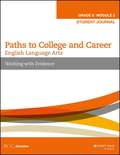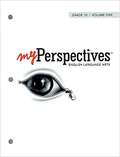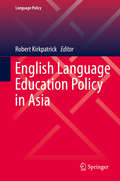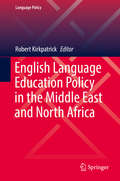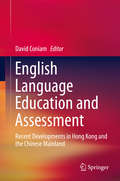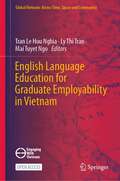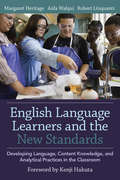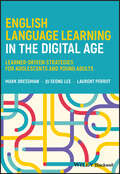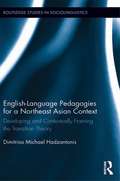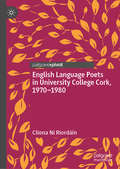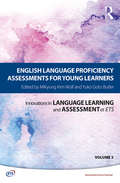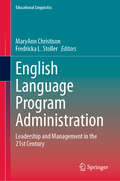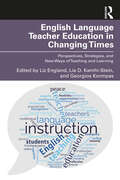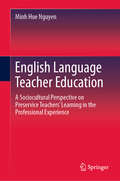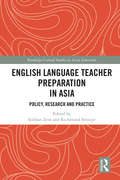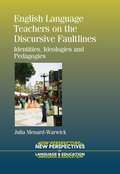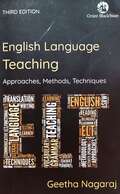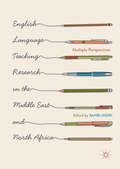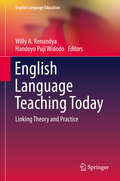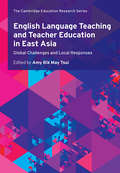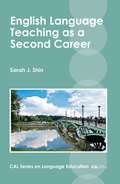- Table View
- List View
English Language Arts, Grade 8 Module 2: Working With Evidence (Paths To College And Career Ser.)
by Public Consulting GroupStudent Journal to accompany Paths to College and Career, English Language Arts, Grade 8, Module 2.
English Language Arts, [Grade 10]: Volume One (myPerspectives)
by Prentice HallmyPerspectives™ English Language Arts is a student-centered learning environment where you will analyze text, cite evidence, and respond critically about your learning. You will take ownership of your learning through goal-setting, reflection, independent text selection, and activities that allow you to collaborate with your peers.
English Language Arts: Practice Tests (Grade 4) (Oklahoma Buckle Down to the OAS,)
by Triumph Learning LlcNIMAC-sourced textbook
English Language Education Policy in Asia
by Robert KirkpatrickThis volume offers comprehensive 'state-of-the-art' overviews of educational policies concerning the teaching of English in a large number of Asian countries. Each contribution is written by a leading expert and gives a clear assessment of current policies and future trends. Starting with a description of the English education policies in the respective countries, the contributors then delve into the 'nuts and bolts' of the English education policies and how they play out in practice in the education system, in schools, in the curriculum, and in teaching. Topics covered include the balance between the acquisition of English and the national language, political, cultural, economic and technical factors that strengthen or weaken the learning of English.
English Language Education Policy in the Middle East and North Africa
by Robert KirkpatrickThis volume offers insights on English language education policies in Middle Eastern and North African countries, through state-of-the-art reports giving clear assessments of current policies and future trends, each expertly drafted by a specialist. Each chapter contains a general description of English education polices in the respective countries, and then expands on how the local English education policies play out in practice in the education system at all levels, in the curriculum, in teaching, and in teacher training. Essays cover issues such as the balance between English and the acquisition of the national language or the Arabic language, as well as political, cultural, economic and technical elements that strengthen or weaken the learning of English. This volume is essential reading for researchers, policy makers, and teacher trainers for its invaluable insights in the role of each of the stakeholders in the implementation of policies.
English Language Education and Assessment
by David ConiamThis volume gathers contributions in the closely linked fields of English language assessment and language education. The contributors from China and Hong Kong represent a mixture of established and new scholars. Areas covered in the language education section range across major developments in the redefining of Hong Kong's secondary and tertiary curricula, as well as the huge field of China's vocational education curriculum. Regarding assessment, the contributions reflect major changes in the marking of examinations in Hong Kong, whereby all examinations from 2012 onwards are marked onscreen, to quality control issues in the administration of China's College English Test, which is taken by over 10 million candidates every year.
English Language Education for Graduate Employability in Vietnam (Global Vietnam: Across Time, Space and Community)
by Ly Thi Tran Tran Le Huu Nghia Mai Tuyet NgoThis open access book examines the teaching and learning of English for employability in Vietnamese higher education. Its content is framed within one country to better examine the research issues within the influence of contextual factors. This book investigates how English can contribute to the development of students' employability capitals, particularly in the aspects of human capital, social capital, cultural capital, identity capital, and psychological capital. It presents employers' and employees’ perspectives of how and why English is increasingly important for career development. This book is a collection of discussions and viewpoints from teachers, students, and other stakeholders like employers, graduates, and course coordinators on current practices and their proposed improvements to prepare students for their future education, work and life. Based on empirical evidence, this book calls for repositioning English language education within the employability agenda to elevate its status and increase stakeholders' engagement. This book contributes to current debates on advancing the effectiveness of English language education in non-English speaking countries, as a response to internationalization and globalization.
English Language Learners and the New Standards: Developing Language, Content Knowledge, and Analytical Practices in the Classroom
by Margaret Heritage Aída Walqui Robert LinquantiIn English Language Learners and the New Standards, three leading scholars present a clear vision and practical suggestions for helping teachers engage ELL students in simultaneously learning subject-area content, analytical practices, and language. This process requires three important shifts in our perspective on language and language learning—from an individual activity to a socially engaged activity; from a linear process aimed at correctness and fluency, to a developmental process, focused on comprehension and communication; and from a separate area of instruction to an approach that embeds language development in subject-area activities. In English Language Learners and the New Standards, the authors:Clarify the skills and knowledge teachers need to integrate content knowledge and language developmentShow how teachers can integrate formative assessment in ongoing teaching and learningDiscuss key leverage points and stress points in using interim and summative assessments with ELLsProvide classroom vignettes illustrating key practicesFinally, the authors explain the theories and research that underlie their vision and examine the role of policy in shaping pedagogy and assessment for ELL students.
English Language Learning in the Digital Age: Learner-Driven Strategies for Adolescents and Young Adults
by Mark Dressman Ju Seong Lee Laurent PerrotENGLISH LANGUAGE LEARNING IN THE DIGITAL AGE ‘The Digital Age has transformed our learning, particularly for adolescents and young adults. This book puts forward innovative methods and observations from which both teachers and students could greatly benefit in the Digital Age. As such, this is a much needed and timely book. I strongly recommend it to all who are interested in language learning.’ —Jieun Kiaer, University of Oxford ‘The authors have created a thoroughly documented, research-based, practical toolkit for 21st-century English language educators worldwide, using compelling storytelling and interactive suggestion. I would use it for teacher training in a flash.’ —Denyze Toffoli, Université Paul Sabatier Toulouse III, IUT-A English Language Learning in the Digital Age is a comprehensive introduction to the theoretical background and real-world application of IDLE (Informal Digital Learning of English). Designed for teachers and future teachers preparing to teach English as a second or other language, this highly practical guide focuses on incorporating digital technology into curricula to draw upon the extracurricular exposures to English that many students experience outside of the classroom. With some creativity and care, teachers can find ways to bring these experiences with English into the classroom, ultimately improving student learning outcomes. Offering a specific focus on examples and case studies drawn from language education in the Middle East, Asia, and Europe, this text employs a three-part structure beginning with the theories behind autonomous learning and the importance of informal language learning for young adults. Part two demonstrates various methods for integrating games, social media, e-books, language software, mobile apps, and other digital resources into the classroom. The third section addresses the use of IDLE methods to bridge the gap between informal and formal uses of English, the advantages and disadvantages of IDLE in flipped classrooms and online teaching, and how IDLE strategies can enhance mandated curricula and better prepare students for national exams. The book concludes with a brief discussion of the future of language learning and the need to include digital technologies and learner-driven strategies in education policy. English Language Learning in the Digital Age is an ideal textbook for upper-level undergraduate and graduate students in the fields of language education and language acquisition, as well as teachers and teachers-in-training who are preparing to teach English in countries where English is not the primary language.
English Language Pedagogies for a Northeast Asian Context: Developing and Contextually Framing the Transition Theory (Routledge Studies in Sociolinguistics)
by Michael HadzantonisThis book investigates, from a sociocultural, linguistic, and pedagogical perspective, the conceptual and pragmatic frameworks that characterize secondary language learning in a Northeast Asian context. Hadzantonis contextualizes these salient domains through an engagement with social and cultural themes such as the familial, political, as well as cultural commodities and socioeducational structures. In this way, the text employs tools such as transnational theory and performativity and develops a model that contributes to the resolution of one of the greatest economic issues of the time, that of ineffective secondary language learning.
English Language Poets in University College Cork, 1970–1980
by Clíona Ní RíordáinThis book looks at a cohort of poets who studied at University College Cork during the 1970s and early 1980s. Based on extensive interviews and archival work, the book examines the notion that the poets form a “generation” in sociological terms. It proposes an analysis of the work of the poets, studying the thematics and preoccupations that shape their oeuvre. Among the poets that figure in the book are Greg Delanty, Theo Dorgan, Seán Dunne, Gerry Murphy, Thomas McCarthy, Gregory O’Donoghue, and Maurice Riordan. The volume is prefaced by Eiléan Ní Chuilleanáin.
English Language Proficiency Assessments for Young Learners
by Mikyung Kim Wolf Yuko Goto ButlerEnglish Language Proficiency Assessments for Young Learners provides both theoretical and empirical information about assessing the English language proficiency of young learners. Using large-scale standardized English language proficiency assessments developed for international or U.S. contexts as concrete examples, this volume illustrates rigorous processes of developing and validating assessments with considerations of young learners’ unique characteristics. In this volume, young learners are defined as school-age children from approximately 5 to 13 years old, learning English as a foreign language (EFL) or a second language (ESL). This volume also discusses innovative ways to assess young learners’ English language abilities based on empirical studies, with each chapter offering stimulating ideas for future research and development work to improve English language assessment practices with young learners. English Language Proficiency Assessments for Young Learners is a useful resource for students, test developers, educators, and researchers in the area of language testing and assessment.
English Language Program Administration: Leadership and Management in the 21st Century (Educational Linguistics #59)
by MaryAnn Christison Fredricka L. StollerThis volume provides both practicing and aspiring Language Program Administrators with knowledge about the research and theory that underpin key topics in educational leadership, as well as practical guidance for the day-to-day management of language programs, including budgets, personnel, decision making, strategic planning, advocacy, and digital technologies. The volume brings together 46 authors and contributors with a vast array of experiences as administrators of English language teaching programs all over the world—in Asia; Australia; Europe; the Middle East; New Zealand; North, Central, and South America; South Africa; Turkey; and the United Kingdom. As the need for more qualified administrators and leaders has increased, more teacher education programs have added formal courses on leadership and program administration to their offerings. Educators teaching these courses will find this volume to be an excellent core text to support students in developing their knowledge of and skills for language program administration. All chapters are connected to the contemporary realities of language program administration, and they offer practical guidance to Language Program Administrators in ways that are adaptable to different administrative contexts globally.
English Language Teacher Education in Changing Times: Perspectives, Strategies, and New Ways of Teaching and Learning
by Liz England Lía D. Kamhi-Stein Georgios KormpasThis volume addresses challenges that the field of English language teacher education has faced in the past several years. The global pandemic has caused extreme stress and has also served as a catalyst for new ways of teaching, learning, and leading. Educators have relied on their creativity and resiliency to identify new and innovative teaching practices and insights that inform the profession going forward. Contributors describe how teacher educators have responded to the specific needs and difficulties of educating teachers and teaching second language learners in challenging circumstances around the world and how these innovations can transform education going forward into the future. Paving the way for a revitalized profession, this book is essential reading for the current and future generations of TESOL scholars, graduate students, and professors.
English Language Teacher Education: A Sociocultural Perspective on Preservice Teachers’ Learning in the Professional Experience
by Minh Hue NguyenThis book examines a range of complex issues concerning the professional experience (i.e., practicum) in English language teacher education with regard to curriculum design and implementation, as well as professional learning. Drawing on a sociocultural perspective, it explores the context of the professional experience, preservice teachers as learners of English language teaching, and the activity of learning to teach English language in connection with interrelated contextual and personal issues: contextual issues such as policies, curricula, university-school partnerships, and mentoring relations are investigated in relation to personal issues such as the beliefs, expectations, prior educational experiences, previous teaching experiences, and cultural-linguistic backgrounds of preservice teachers. In turn, the book addresses professional learning issues, including professional identity development, emotional experiences, and pedagogical learning, in depth. The book delves into the qualitative “fine-grained” aspects of the professional experience while also making valuable conceptual contributions through a sociocultural analysis of the professional learning experience, which can also be applied to research in other teacher education contexts. The findings presented here hold practical implications for English language teacher education in terms of developing a knowledge base for English language teaching and an effective model of professional experience to prepare English language teachers for working in today’s expanded, diverse and dynamic neoliberal contexts.
English Language Teacher Preparation in Asia: Policy, Research and Practice (Routledge Critical Studies in Asian Education)
by Subhan Zein Richmond StroupeBringing together a comprehensive range of extended research-based chapters, English Language Teacher Preparation in Asia provides comprehensive insight into policy, research, and practical aspects of teacher preparation for English teachers at pre-service level across multiple contexts in Asia. Written by local and international scholars specialising in TESOL Teacher education, and acknowledging the increasingly complex demands made on teachers of English in view of globalisation, the book explores the multiple factors which are key to effective professional learning. Chapters consider how pre-service teachers are best prepared for the diverse contexts in which English is learnt and taught in settings throughout Asia and draw on in-depth research studies to provide rich, fully contextualised coverage of aspects of teacher preparation including curriculum design, programme development, policy, professional learning communities, assessment education, and teaching practicum. A timely contribution to the field of teacher preparation, this text will be an invaluable resource for teacher educators, pre-service teachers and academics involved in the preparation of English teachers in Asia.
English Language Teachers on the Discursive Faultlines
by Julia Menard-WarwickThis book brings the voices of teachers into the fierce debates about language ideologies and cultural pedagogies in English language teaching. Through interviews and classroom observations in Chile and California, this study compares the controversies around English as a global language with the similar cultural tensions in programs for immigrants. The author explores the development of teacher identity in these two very different contexts, and through the narratives of both experienced and novice teachers demonstrates how teacher identity affects the cultural pedagogies enacted in their classrooms.
English Language Teaching (ELT): Approaches, Methods, Techniques
by Geetha NagarajWhat ideas about language learning and teaching underlie classroom practices? How have these theories influenced teaching and materials production over the years? What teaching techniques and aids can optimise the English teacher's efforts in the classroom? What criteria can help the teacher evaluate a learner's progress? This book gives valuable insights into the principles of English language teaching-and the ways of translating them into practice. In this revised edition numerous examples of activities and tasks that teachers can adapt for their use excerpts that put readers in touch with the opinions of pioneers in the field of ELT updated information on the use of digital tools and platforms as teaching and learning aids sections that ask the reader to pause, reflect on, and question what is being discussed, practical exercises that allow readers to apply their learning to real situations charts, diagrams and images to help the reader quickly grasp key points, a glossary of essential terms, a list of teachers' resource books, and more! English Language Teaching: Approaches, Methods, Techniques is essential reading for all English teachers, teacher-trainers, and ELT materials writers.
English Language Teaching Research in the Middle East and North Africa: Multiple Perspectives
by Sahbi HidriThis edited collection examines a range of English Language Teaching (ELT) research in the Middle East and North Africa (MENA). While the MENA context has witnessed considerable change in recent years, it has so far been under-represented in ELT research at both the regional and the international level. This book aims to fill that gap by surveying the current state of the field, examining in detail a range of issues and concepts, and suggesting future directions for further research. It will be of interest to ELT researchers and practitioners in general - not just those based in MENA contexts themselves.
English Language Teaching Today
by Willy A. Renandya Handoyo Puji WidodoEnglish Language Teaching Today: Linking Theory and Practice provides an up-to-date account of current principles and practices for teaching English in the world today. The chapters, written by internationally recognized language teacher educators and TESOL specialists, introduce the reader to key language skill areas (i. e. , listening, speaking, reading, writing, pronunciation, grammar and vocabulary) and explain how each skill area can be taught in a principled manner in diverse language learning contexts. Throughout the book, the link between theory and practice is explicitly highlighted and exemplified. This reader-friendly book is suitable for undergraduate and graduate students enrolled in TESOL and other second language education programmes as well as for TESOL professionals who wish to stay current with recent developments in ELT.
English Language Teaching and Teacher Education in East Asia: Global Challenges and Local Responses (Cambridge Education Research)
by Tsui, Amy Bik MayThe spread of English is so much an integral part of globalization that it has become an essential global literacy skill. In Asia, this poses immense challenges to governments and English language teaching and teacher education professions as they attempt to meet this demand from students for a high level of English proficiency. This volume examines English language education policies across ten Asian jurisdictions, the corresponding teacher education policies, and how these policies affect teachers and teacher educators. Each chapter covers a different jurisdiction, and is written by a scholar engaged in the implementation of government policies on English language and teacher education, providing the reader with insiders' perspectives. It gives a fascinating glimpse into the remarkable similarities in the challenges posed to these countries and the critical issues that have emerged from the local responses despite their markedly different socioeconomic, political, cultural and historical backgrounds.
English Language Teaching as a Second Career
by Sarah J. ShinThis book explores the experiences of men and women who train to teach ESL as a second career. Drawing from in-depth interviews and observations of 30 students (aged 45 to 73) in a TESOL graduate program, this book provides portraits of these individuals as they develop as teachers. It describes the processes they go through to launch their teaching careers, the successes and challenges they face, and the evolving significance of their work in their overall life goals and achievements. A welcome addition to the growing literature on teacher development, this book will be an important resource for teacher trainers and anyone working in TESOL.
